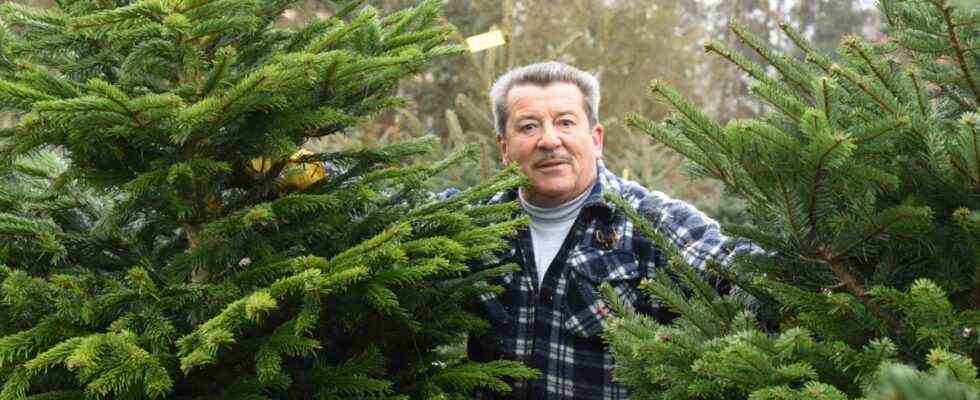The temperatures are falling, the first snow of this winter is announced and gingerbread has been on supermarket shelves for weeks. But nothing heralds the Christmas season more than a green, richly decorated Christmas tree in the living room. With the cutting of the first tree on the Tannenhof Oberweilbach in the district of Dachau, the season starts this Friday, so that every household can receive their tree until the first Sunday in Advent, if necessary. Despite the Corona-related requirements, the salespeople forecast good business and, with their creative ideas, follow a topic that is becoming more and more important for their customers – regionality.
Even before the actual sales start on Saturday, Claus Meier from the Indersdorf Christmas tree stalls has his hands full. The large trees for the companies have already been felled and must now be sent. “So that they are already there on time for the first Advent,” he explains. He has been producing and selling Christmas trees in all sizes on his farm for 20 years. These can either be bought freshly cut on the farm or cut in the culture directly behind them. As a spectacle for the whole family, he expects a big crowd, especially there. “People just want to know where the tree came from, where it grew,” explains Meier. Trees that are marked with the “Bavarian Christmas tree” banderole are therefore particularly popular with many customers. In addition to regionality, the certificate obliges to additional requirements. For example, the trees must not have been treated with pesticides in the past three years and have not been cut before November 10th.
Environmentally friendly: Michael Hutner makes a tree transportable with fully recyclable sisal cord.
(Photo: Toni Heigl)
“The trees are really beautiful this year,” enthuses Meier. That is due to the good conditions. The Nordmann fir – still by far the bestseller among the Christmas trees – has grown very nicely this year due to the high humidity. The price will not rise, however: As has been the case for nine years now, the meter costs between 18 and 25 euros.
What can take place on the farms and plantations in addition to the sale of Christmas trees is still unclear. In Meiers Christbaumstadl there should be sausages and mulled wine for refreshment like every year – but this time only to-go. “With the sausage roll in hand, people can then choose the culture and their tree,” says Meier. He is not allowed to offer any seating, as in the previous year, sales have been moved outside and there is also a mask requirement, at least in the sales booth. A hut with regional products on the farm and guided tours through the cultures are also planned, “to bring the Christmas tree closer to the customers in the spirit of regionality,” says Meier. How these ideas can be implemented, however, still has to be decided in consultation with the district office. Despite all the adversities, the seller expects a good season. If people had to stay at home, “then at least they want to make it nice,” he speculates. And as soon as possible. “People buy their trees earlier every year.” As a result, he expects a large crowd on the first and second weekend in Advent.
The best regional and organic – this is also recommended by the Association of Nature Conservation in Bavaria for the ideal Christmas tree. The optimal, sustainable tree should come straight from the forest. It was neither planted nor pruned for the purpose of Christmas and is incurred during forest maintenance anyway. Such a sapling can often be obtained on request from forest owners or foresters. According to the BN, organic-certified Christmas trees are a good alternative. The range of pesticide-free and fertilizer-free cultivation ranges from the high standards of the Demeter, Bioland, Biokreis and Naturland associations, which the BN particularly recommends, to EU organic certification towards the voluntary self-commitment of the seller. fvh
Offering customers a colorful program for everything to do with Christmas tree purchases has been part of the business model at Tannenhof Oberweilbach for many years. The trailer trips with the “Tannenhof Express” into the Christmas tree culture will take place at Stefan Spennesberger’s again this year. The in-house Christmas market on the large site, on the other hand, will not take place as planned. In addition to a Christmas bakery and Kripperlhütte, regional products from companies in the surrounding districts should also be sold there. Because of the current Corona situation, you now have to improvise, close or move some huts, says Spennesberger, “so that no market character comes into being”. But there will still be mulled wine and something to eat for everyone who needs something to eat after cutting down the trees.
The Himmelreich Christmas tree market in Neuhimmelreich near Bergkirchen completely dispenses with the sale of food and drinks. “We are only selling Christmas trees,” says the person in charge of the market, Gisela Hutner. Nevertheless, there is a warming punch – free of charge when you buy a tree. In Neuhimmelreich, too, the preparations are still in full swing. Her husband takes care of the trees every day, says Hutner. “They don’t turn out so beautiful on their own.” Like the Christmas tree stalls in Indersdorf, the small family business has recognized the trend of the past few years – and has adapted. For the first time this year, the Christmas tree from the Himmelreich Christmas tree market will be packed plastic-free with fully recyclable sisal cord in the so-called fir twister.

